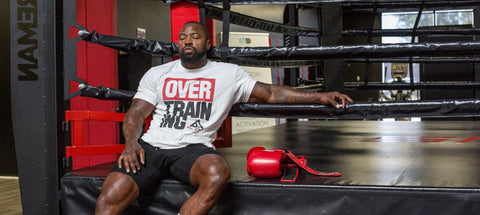I get asked at least once a week “Hey Mike, I train chest three times a week. Am I overtraining?” or someone will ask me “Hey Mike, what is overtraining? Can I train shoulders every other day or will I lose gains because of overtraining?”
Now, a lot of people would think that I’d get pissed off answering the same fuckin question over and over.
But that’s not true. Not at all.
I love answering these types of questions because If you’ve been following me for the last few years then you know that “overtraining” is something I’ve been preaching against, like, forever.
But what’s actually annoying to me is that when you punch that question into Google, you’ll get a half-dozen articles warning you about the dangers of overtraining.
They’ll tell you “look for the signs” and watch out for overtraining...like it’s cold you’re gonna catch if you don’t wash your fuckin hands.
So let’s get into it. Let’s talk what overtraining is, what it looks like, and how people who are actually at risk of overtraining avoid it.
Related: Overtraining Solution® speeds up recovery like crazy. Stop getting sore today.
What is Overtraining?
So let’s get this out of the way first. What is overtraining?
Overtraining is an actual, medically-recognized condition called “overtraining syndrome.”
However, according to the European College of Sports Science, overtraining syndrome “remains a clinical diagnosis with arbitrary definitions.”
So even though someone can be overtrained, we don’t know what actually defines that clinical diagnosis.
Experts describe overtraining as being sort of similar to depression or anxiety--but not exactly like them at all.
After spending many years training clients, working with athletes, and pushing my own body to its limits, I can tell you quite a bit about overtraining.
It’s not just having really sore muscles or not seeing the results you want in the gym.
In fact, I can confidently say that almost no one who goes to the gym on a regular basis is at risk of overtraining.
What I think happens to most people that don’t see the results that they want is that they don’t give their body time to recover.
What is Happening to the Body During Overtraining?
Physically, what is going on in the body during overtraining is extreme immune system decline and whole-body inflammation.
When you train, you break down muscle fibers and put your body through extreme stress.
In response to that, your body inflames the injured parts of your body so they get extra blood and nutrients to heal.
But during overtraining, that inflammation spreads to the entire body.
This could explain why people who are overtrained experience mood swings, insomnia, and apathy towards their sport.
Are You At Risk of Overtraining?
The people who are at the highest risk of overtraining and typically long-distance athletes and strength athletes.
These are swimmers, runners, powerlifters, NFL athletes: those types of high-performing individuals.
These are the people who have professional coaches pushing them every step of the way, reaching higher, going farther.
It can be the college athlete hoping to get that scholarship. The NFL prospect hoping to get drafted.
These people train multiple times a day as hard as they can go. Every set, every step, every lap.
Usually, there is a point to this sort of training and it’s called “over reaching.”
Overreaching is actually a very popular training technique to prepare for a fight, marathon, triathlon, or powerlifting meet. This is sometimes called “peaking.”
What these athletes do, is they try to push themselves as hard as they can.
They purposefully try get as close as they can to being “overtrained.”
Then, a day or two before their event, they dramatically taper off so that by the time they need to perform, they are rested but their bodies are at their peak.
However, what sometimes happens is that they pass this threshold and become overtrained.
They experience that apathy, whole body inflammation, they often get sick, and sometimes even lose weight.
Worry More About Under Recovering
Now that you know more about what overtraining is, you can probably see that for the most active people struggling to reach their fitness goals, the problem is not overtraining.
Doing bench press four days a week is not going to “overtrain” your chest and “kill your gains.”
Hitting shoulders and arms every other day isn’t going to overtrain you.
What actually will give you suboptimal results is staying out until 2am Thursday through Saturday.
Getting 6.5 hours of sleep Monday through Thursday will kill your gains.
Eating fast food every other day and drinking a few beers or glasses of wine every night will not help you get the body you want.
Lack of sleep and quality nutrition are what hinder your progression 99.99% of the time.
You know you should be going to be before 10pm. You know you should be eating more vegetables, less refined sugar, less processed carbs, and more lean meats.
I’ve trained a lot of people in my day, worked with private clients, and taught large groups of people.
The vast majority of people fail to reach their weight loss or muscle building goals because of inadequate sleep and bad eating habits.
That’s it.
It’s not overtraining. It’s lack of self control.
Why I Created Overtraining Solution
I created a product called Overtraining Solution precisely for people who are pushing themselves 4, 5, 6 days a week in the gym.
It is not a pre-workout or a muscle building product. It is a recovery tool, and a fuckin good one.
It addresses exactly the things we just talked about: inflammation and immune system.
Overtraining Solution contains 2.5 grams of peptides. What are peptides? Simply put, they are shorter protein strings. This allows your body to break them down and use them faster for muscle recovery.
It also has this incredibly healthy product in it called Immulina, to boost your immune system and keep you from getting sick.
The end result: you can train again sooner without feeling sore or feeling ill.
Check out Overtraining Solution here to learn more.












